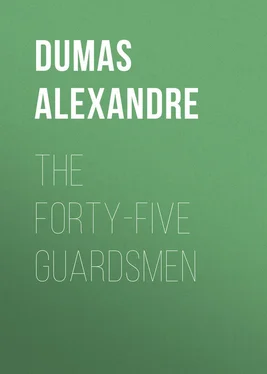Alexandre Dumas - The Forty-Five Guardsmen
Здесь есть возможность читать онлайн «Alexandre Dumas - The Forty-Five Guardsmen» — ознакомительный отрывок электронной книги совершенно бесплатно, а после прочтения отрывка купить полную версию. В некоторых случаях можно слушать аудио, скачать через торрент в формате fb2 и присутствует краткое содержание. Жанр: literature_19, foreign_antique, foreign_prose, на английском языке. Описание произведения, (предисловие) а так же отзывы посетителей доступны на портале библиотеки ЛибКат.
- Название:The Forty-Five Guardsmen
- Автор:
- Жанр:
- Год:неизвестен
- ISBN:нет данных
- Рейтинг книги:3 / 5. Голосов: 1
-
Избранное:Добавить в избранное
- Отзывы:
-
Ваша оценка:
- 60
- 1
- 2
- 3
- 4
- 5
The Forty-Five Guardsmen: краткое содержание, описание и аннотация
Предлагаем к чтению аннотацию, описание, краткое содержание или предисловие (зависит от того, что написал сам автор книги «The Forty-Five Guardsmen»). Если вы не нашли необходимую информацию о книге — напишите в комментариях, мы постараемся отыскать её.
The Forty-Five Guardsmen — читать онлайн ознакомительный отрывок
Ниже представлен текст книги, разбитый по страницам. Система сохранения места последней прочитанной страницы, позволяет с удобством читать онлайн бесплатно книгу «The Forty-Five Guardsmen», без необходимости каждый раз заново искать на чём Вы остановились. Поставьте закладку, и сможете в любой момент перейти на страницу, на которой закончили чтение.
Интервал:
Закладка:
"And like you, Chicot. However, I have forty-five formidable swords at command."
"Commanded by the 46th, whom they call D'Epernon."
"Not exactly."
"By whom, then?"
"De Loignac."
"And it is with them you think to defend yourself?"
"Yes, mordieu! yes."
"Well, I have more troops than you."
"You have troops?"
"Why not?"
"What are they?"
"You shall hear. First, all the army that MM. de Guise are raising in Lorraine."
"Are you mad?"
"No; a real army – at least six thousand men."
"But how can you, who fear M. de Mayenne so much, be defended by the soldiers of M. de Guise?"
"Because I am dead."
"Again this joke!"
"No; I have changed my name and position."
"What are you, then?"
"I am Robert Briquet, merchant and leaguer."
"You a leaguer?"
"A devoted one, so that I keep away from M. de Mayenne. I have, then, for me, first, the army of Lorraine – six thousand men; remember that number."
"I listen."
"Then, at least one hundred thousand Parisians."
"Famous soldiers!"
"Sufficiently so to annoy you much: 6,000 and 100,000 are 106,000; then there is the pope, the Spaniards, M. de Bourbon, the Flemings, Henry of Navarre, the Duc d'Anjou – "
"Have you done?" interrupted Henri, impatiently.
"There still remain three classes of people."
"What are they?"
"First the Catholics, who hate you because you only three parts exterminated the Huguenots: then the Huguenots, who hate you because you have three parts exterminated them; and the third party is that which desires neither you, nor your brother, nor M. de Guise, but your brother-in-law, Henri of Navarre."
"Provided that he abjure. But these people of whom you speak are all France."
"Just so. These are my troops as a leaguer; now add, and compare."
"You are joking, are you not, Chicot?"
"Is it a time to joke, when you are alone, against all the world?"
Henri assumed an air of royal dignity. "Alone I am," said he, "but at the same time I alone command. You show me an army, but where is the chief? You will say, M. de Guise; but do I not keep him at Nancy? M. de Mayenne, you say yourself, is at Soissons, the Duc d'Anjou is at Brussels, and the king of Navarre at Pau; so that if I am alone, I am free. I am like a hunter in the midst of a plain, waiting to see his prey come within his reach."
"On the contrary; you are the game whom the hunters track to his lair."
"Chicot!"
"Well! let me hear whom you have seen come."
"No one."
"Yet some one has come."
"Of those whom I named?"
"Not exactly, but nearly."
"Who?"
"A woman."
"My sister Margot?"
"No; the Duchesse de Montpensier."
"She! at Paris?"
"Mon Dieu! yes."
"Well, if she be; I do not fear women."
"True; but she comes as the avant courier to announce the arrival of her brother."
"Of M. de Guise?"
"Yes."
"And do you think that embarrasses me? Give me ink and paper."
"What for? To sign an order for M. de Guise to remain at Nancy?"
"Exactly; the idea must be good, since you had it also."
"Execrable, on the contrary."
"Why?"
"As soon as he receives it he will know he is wanted at Paris, and he will come."
The king grew angry. "If you only returned to talk like this," said he, "you had better have stayed away."
"What would you have? Phantoms never flatter. But be reasonable; why do you think M. de Guise remains at Nancy?"
"To organize an army."
"Well; and for what purpose does he destine this army?"
"Ah, Chicot! you fatigue me with all these questions."
"You will sleep better after it. He destines this army – "
"To attack the Huguenots in the north – "
"Or rather, to thwart your brother of Anjou, who has called himself Duke of Brabant, and wishes to build himself a throne in Flanders, for which he solicits your aid – "
"Which I never sent."
"To the great joy of the Duc de Guise. Well, if you were to feign to send this aid – if they only went half way – "
"Ah! yes, I understand; M. de Guise would not leave the frontier."
"And the promise of Madame de Montpensier that her brother would be here in a week – "
"Would be broken."
"You see, then?"
"So far, good; but in the south – "
"Ah, yes; the Béarnais – "
"Do you know what he is at?"
"No."
"He claims the towns which were his wife's dowry," said the king.
"Insolent! to claim what belongs to him."
"Cahors, for example; as if it would be good policy to give up such a town to an enemy."
"No; but it would be like an honest man."
"But to return to Flanders. I will send some one to my brother – but whom can I trust? Oh! now I think of it, you shall go, Chicot."
"I, a dead man?"
"No; you shall go as Robert Briquet."
"As a bagman?"
"Do you refuse?" – "Certainly."
"You disobey me!"
"I owe you no obedience – "
Henri was about to reply, when the door opened and the Duc de Joyeuse was announced.
"Ah! there is your man," said Chicot; "who could make a better ambassador?"
Chicot then buried himself in the great chair, so as to be quite invisible in the dim light. M. de Joyeuse did not see him. The king uttered a cry of joy on seeing his favorite, and held out his hand.
"Sit down, Joyeuse, my child," said he; "how late you are."
"Your majesty is very good," answered Joyeuse, approaching the bed, on which he sat down.
CHAPTER XV.
THE DIFFICULTY OF FINDING A GOOD AMBASSADOR
Chicot was hidden in his great chair, and Joyeuse was half lying on the foot of the bed in which the king was bolstered up, when the conversation commenced.
"Well, Joyeuse," said Henri, "have you well wandered about the town?"
"Yes, sire," replied the duke, carelessly.
"How quickly you disappeared from the Place de Greve."
"Sire, to speak frankly, I do not like to see men suffer."
"Tender heart."
"No; egotistical heart, rather; then sufferings act on my nerves."
"You know what passed?"
"Ma foi! no."
"Salcede denied all."
"Ah!"
"You bear it very indifferently, Joyeuse."
"I confess I do not attach much importance to it; besides, I was certain he would deny everything."
"But since he confessed before the judges – "
"All the more reason that he should deny it afterward. The confession put the Guises on their guard, and they were at work while your majesty remained quiet."
"What! you foresee such things, and do not warn me?"
"I am not a minister, to talk politics."
"Well, Joyeuse, I want your brother."
"He, like myself, is at your majesty's service."
"Then I may count on him?"
"Doubtless."
"I wish to send him on a little mission."
"Out of Paris?"
"Yes."
"In that case, it is impossible."
"How so?"
"Du Bouchage cannot go away just now."
The king looked astonished. "What do you mean?" said he.
"Sire," said Joyeuse quietly, "it is the simplest thing possible. Du Bouchage is in love, but he had carried on his negotiations badly, and everything was going wrong; the poor boy was growing thinner and thinner."
"Indeed," said the king, "I have remarked it."
"And he had become sad, mordieu! as if he had lived in your majesty's court."
A kind of grunt, proceeding from the corner of the room interrupted Joyeuse, who looked round astonished.
"It is nothing, Joyeuse," said the king, laughing, "only a dog asleep on the footstool. You say, then, that Du Bouchage grew sad? – "
"Sad as death, sire. It seems he has met with some woman of an extraordinary disposition. However, one sometimes succeeds as well with this sort of women as with others, if you only set the right way to work."
Читать дальшеИнтервал:
Закладка:
Похожие книги на «The Forty-Five Guardsmen»
Представляем Вашему вниманию похожие книги на «The Forty-Five Guardsmen» списком для выбора. Мы отобрали схожую по названию и смыслу литературу в надежде предоставить читателям больше вариантов отыскать новые, интересные, ещё непрочитанные произведения.
Обсуждение, отзывы о книге «The Forty-Five Guardsmen» и просто собственные мнения читателей. Оставьте ваши комментарии, напишите, что Вы думаете о произведении, его смысле или главных героях. Укажите что конкретно понравилось, а что нет, и почему Вы так считаете.












